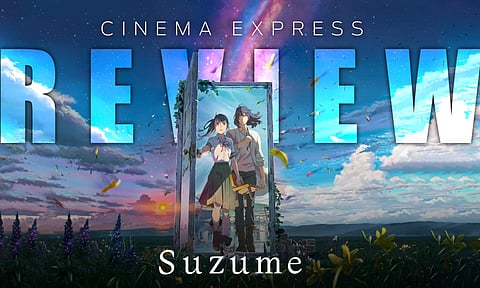Suzume Movie Review: Offers the depth of poetry through the richness of unbridled imagination
Rating:(3 / 5)
Makoto Shinkai’s films have the distinct capacity to capture even melancholy with joyful vivacity. Even the deeply personal is communicated through the impending doom of a natural calamity. In Your Name, love and longing are tied to a meteor crash, In Weathering With You, familial ties and sacrifice are connected to climate change, and in Suzume, themes like grief and acceptance are interwoven in a story about an interdimensional rift that creates calamitous earthquakes.
Director: Makoto Shinkai
Cast: Nanoka Hara, Hokuto Matsumura, Eri Fukatsu, Shota Sometani
Suzume is about a 17-year-old girl who teams up with a young man to close interdimensional rifts across Japan, through which a supernatural worm might enter our world and cause catastrophic seismic events. The young man, named Souta, gets turned into a child’s chair by a guardian angel/god (Kami) who takes the form of a cat when it is not guarding the portals. Throughout the film we go on a classic adventure with Suzume and Souta, across Japan, as they track down the cat in order to make it lift its curse on Souta, they also have their hands full as interdimensional rifts keep opening everywhere they go.
Considered to be one of the finest filmmakers from Japan, Shinkai is often compared to the legendary director Hayao Miyazaki(co-founder of Studio Ghibli), with some even calling him “The next Miyazaki'' While Shinkai has politely refrained from indulging in such adulations so far, he has nevertheless paid his homage to Miyazaki in Suzume by loading it with multiple Ghibli references. Not just the references, the DNA of Suzume in itself feels more like a Ghibli film than a typical Shinkai film. While the filmmaker is known for employing fantasy and supernatural elements in his films, ornamentations to the story like the talking cat, supernatural worm, and talking chair, all seem closer in spirit to a Ghibli outing. While this reverential imitation was amusing at the beginning, the absence of Shinkai’s uniqueness, that which we came for, is noticeably felt. While Suzume does not lack the visual splendour endemic in Shinkai's films, it still fails to stand anywhere near the top of his filmography, when ranked by visuals alone.
Suzume is about love, loss, grief, and acceptance. The text and the subtext are interwoven with equal prominence and the themes at the heart of the story are not lost in the cacophony of visual spectacle. The beauty of Japanese anime, and the grammar of Miyazaki and his successors like Shinkai, lies in how their films reach their sublime peaks at the most indulgent moments. In sharp contrast to Western animation, Japanese anime reels the audience in for a closer, intimate moment during scenes that offer less to no momentum to the story. We feel closest to the characters when they are sitting together on a ferry, looking forlornly at the moon, sharing silence and desolation, and finding hope in each other's company. It is refreshing how Suzume does not adhere to the commercial skeleton of modern blockbusters and yet, has all the story beats of a traditional adventure story.
Shinkai is a master at blending fantasy and supernatural and housing it firmly in the modern world, without compromises. As the chair, followed by a schoolgirl, chases a talking cat across Japan, we are not cheated out of reality as the entire world seems oblivious to the oddity. Instead, we see the bizarre events being reflected across social media platforms, and we see people—Japan itself—reacting to this event. And yet it is done in a tasteful manner that does not alter the course of the story in a needlessly contrived and exorbitant way.
If poetry is all about mining precious specks of truth out of the fabric of existence and presenting it with the beauty of words, then Shinkai’s films are a form of poetry, only it uses the sublime language of animation instead. As for the truth in Suzume, it tells us that dealing with grief could be as difficult as stopping inter-dimensional worms from crossing over to our world and causing calamitous earthquakes. But with the help of our loved ones, we can not only stop earthquakes but also reach back into the past and give the long-pending hug to our younger selves, thereby sealing old wounds and stopping any more supernatural worms from crossing over.

